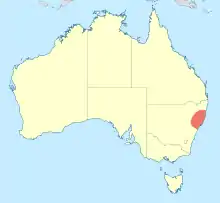Griseargiolestes bucki
Griseargiolestes bucki is a species of Australian damselfly in the family Megapodagrionidae,[3] commonly known as a turquoise flatwing.[4] It is endemic to the Barrington Tops area of New South Wales, where it inhabits streams, bogs and seepages.[5]
| Turquoise flatwing | |
|---|---|
| Scientific classification | |
| Kingdom: | Animalia |
| Phylum: | Arthropoda |
| Class: | Insecta |
| Order: | Odonata |
| Suborder: | Zygoptera |
| Family: | Megapodagrionidae |
| Genus: | Griseargiolestes |
| Species: | G. bucki |
| Binomial name | |
| Griseargiolestes bucki Theischinger, 1998[2] | |
 | |
G. bucki is a medium-sized damselfly, black-green metallic in colour with pale markings, and slightly pruinescent.[4] Like other members of the family Megapodagrionidae it rests with its wings outspread.[6]
G. bucki appears similar to Griseargiolestes albescens, which is found in coastal areas of north-eastern New South Wales and south-eastern Queensland.[4]
Gallery
.jpg.webp) Tip of female tail
Tip of female tail.jpg.webp) Tip of male tail
Tip of male tail.jpg.webp) Female wings
Female wings.jpg.webp) Male wings
Male wings
See also
References
| Wikimedia Commons has media related to Griseargiolestes bucki. |
- Dow, R.A. (2017). "Griseargiolestes bucki". IUCN Red List of Threatened Species. 2017: e.T163558A87527394. doi:10.2305/IUCN.UK.2017-1.RLTS.T163558A87527394.en.
- Theischinger, G. (1998). "A new species of Griseargiolestes Theischinger from Australia (Odonata: Zygoptera: Megapodagrionidae)" (PDF). Stapfia. 55: 623–627 [623].
- "Species Griseargiolestes bucki Theischinger, 1998". Australian Faunal Directory. Australian Biological Resources Study. 2012. Retrieved 14 April 2017.
- Theischinger, Günther; Hawking, John (2006). The Complete Field Guide to Dragonflies of Australia. Collingwood, Victoria, Australia: CSIRO Publishing. p. 50. ISBN 978-0-64309-073-6.
- Theischinger, Gunther; Endersby, Ian (2009). Identification Guide to the Australian Odonata (PDF). Department of Environment, Climate Change and Water NSW. p. 215. ISBN 978-1-74232-475-3.
- Watson, J.A.L.; Theischinger, G.; Abbey, H.M. (1991). The Australian Dragonflies: A Guide to the Identification, Distributions and Habitats of Australian Odonata. Melbourne: CSIRO. ISBN 0643051368.
This article is issued from Wikipedia. The text is licensed under Creative Commons - Attribution - Sharealike. Additional terms may apply for the media files.

